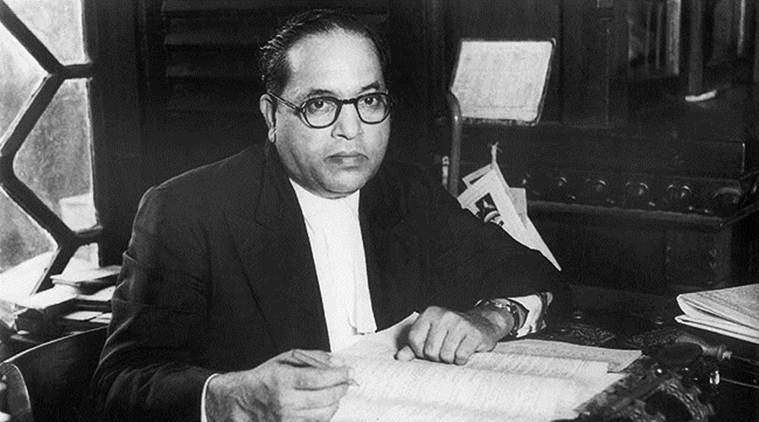But do you know how much India's first Prime Minister Nehru and Deputy Prime Minister and Home Minister Vallabhbhai Patel hated Ambedkar that they did everything possible to prevent Ambedkar from reaching the Constituent Assembly? In this article, from the research article of Professor Mirza Asmer Baig of Aligarh Muslim University, we are giving you information that why Nehru and Patel hate Bhim Rao Ambedkar.

IMAGE CREDIT-https://indianexpress.com
Viewpoint: Why did Nehru and Patel hate Bhim Rao Ambedkar?
A Constituent Assembly was to be formed for India and the Congress did everything possible to prevent Ambedkar from participating in the Constituent Assembly.
The image of Ambedkar in the country as a famous social reformer was a matter of concern for Congress. This was the reason why the Congress party and Nehru planned to keep him away from the Constituent Assembly.
Let us tell you that Ambedkar was not among the first 296 members elected to the Constituent Assembly. Apart from this, Ambedkar could not even join the Scheduled Castes Association of Bombay to become a member.
The then Chief Minister of Bombay, BG Kher, at the behest of Bhallabhbhai Patel, ensured that Ambedkar should not be elected to the 296-member body under any circumstances.
Support of Jogendranath Mandal and Muslim League
When Ambedkar failed in Bombay, Jogendranath Mandal, a Dalit leader from Bengal, came forward to help him. He was successful in sending Ambedkar to the Constituent Assembly with the help of the Muslim League.
Let us tell you that Jogendranath Mandal later became the first Law Minister of Pakistan. It is a controversial story that in 1950 he left Pakistan and returned to India.
On the other hand, Bhimrao Ambedkar had to overcome some other hurdles before reaching the Constituent Assembly.
Despite being a Hindu majority at the time of partition, possibly to deter Ambedkar, four districts were handed over to Pakistan.
The districts whose votes led Ambedkar to the Constituent Assembly became part of East Pakistan (now Bangladesh), despite being a Hindu majority.
The result of all this was that Ambedkar became a member of the Constituent Assembly of Pakistan. His membership in the Constituent Assembly of India was abolished.
After the formation of Pakistan as a separate country, the members of the Constituent Assembly were again elected from the parts of Bengal that had remained in India.
When there was no hope left, Ambedkar threatened that he would not accept the Constitution and make it a political issue.
It is said that only after this the Congress high command decide to give him a place in the Constituent Assembly. Meanwhile, MR Jayakar, a member of Bombay, resigned from his post in the Constituent Assembly.
The Congress party decided that the vacancy of MR Jayakar would be filled by Ambedkar.
Anger over Hindu Code Bill
When Ambedkar resigned from the cabinet in September 1951, he explained in detail the reasons for his resignation. He was angry with the government's neglect of the Scheduled Castes.
Ultimately, what forced him to resign was the Congress government's handling of the Hindu Code Bill.
This bill (Hindu Code Bill) was introduced in the house in 1947 but it was taken down without any discussion. Ambedkar believed that if this bill was passed, it would have been the biggest social reform undertaken by the legislature of this country.
Ambedkar said that the bill was dropped in Parliament despite assurances from Prime Minister Jawaharlal Nehru.
At the end of his speech, Ambedkar said, "If I don't think there should be a difference between the Prime Minister's promise and the work, it is certainly not my fault."
Nehru did not hide his dislike for Ambedkar
Even after this, Ambedkar continued to oppose Congress.
In 1952, Ambedkar contested the North Mumbai Lok Sabha seat. But the Congress fielded Ambedkar's former aide NS Kajolkar in front of Ambedkar and Ambedkar lost the election.
The Congress in its clarification said that Ambedkar was with the social party, so he had no option but to protest.
Nehru visited the constituency twice during the election campaign and in the end, Ambedkar lost the election by 15,000 votes.
But the matter did not end here, in the Bandara Lok Sabha by-election in 1954, Ambedkar once again tried his luck, but this time also he had to face defeat from the Congress.
These incidents prove that Congress and its senior leaders especially Nehru never trusted Ambedkar nor tried to hide his dislike. Therefore, Nehru did not leave any opportunity to create obstacles in the way of Ambedkar and Patel was always with Nehru in his work.
Source- Mirza Asmer Baig for BBC
Professor, Aligarh Muslim University


